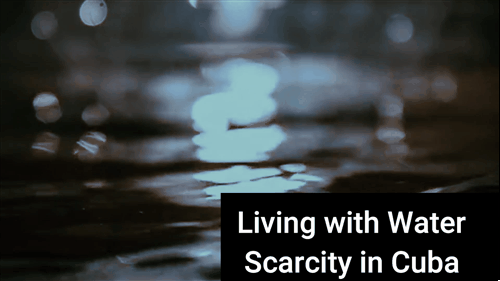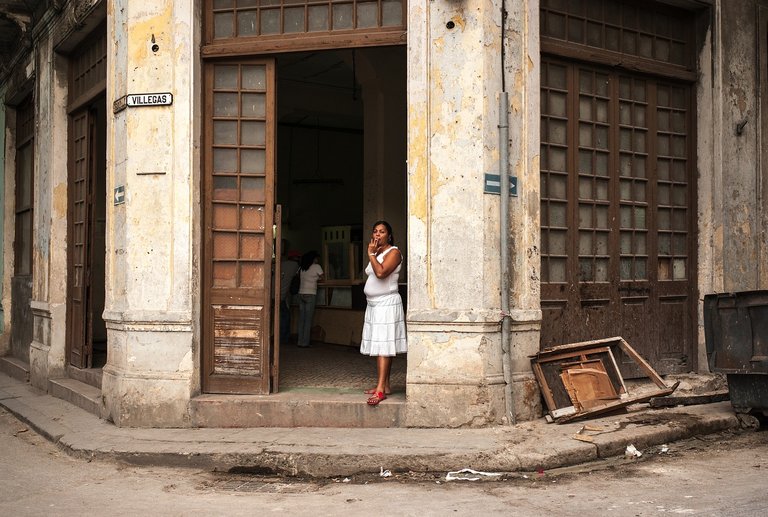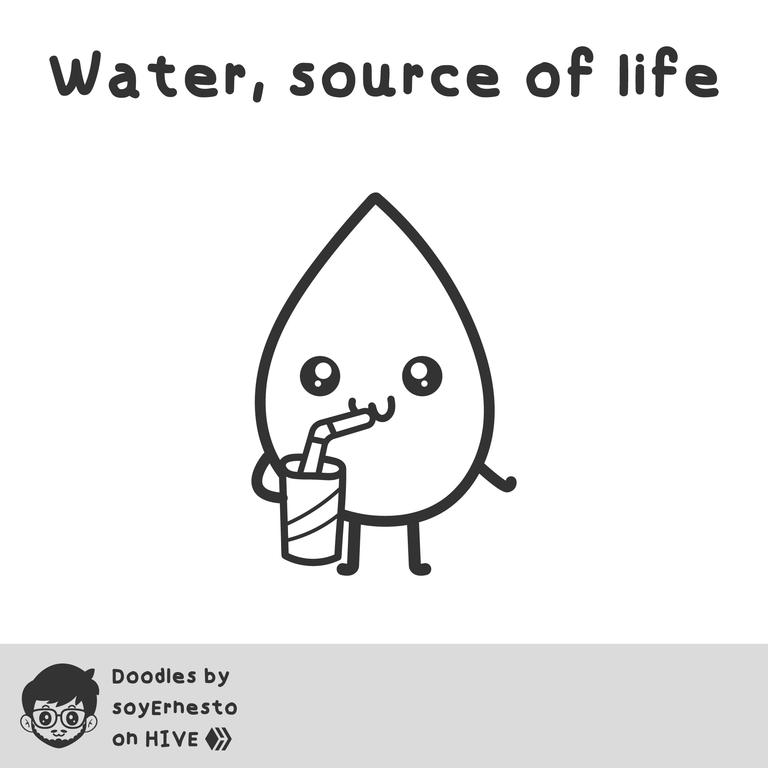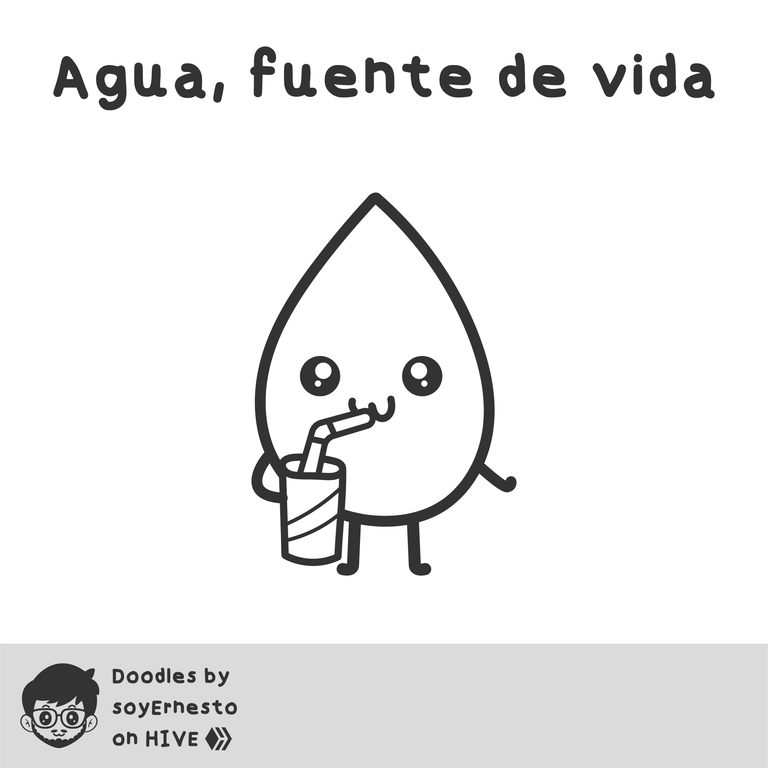How many things do we take for granted in our daily lives? Sometimes, routines lead us to operate in automatic mode, leaving for later small changes that could cause us almost immediate benefits. When you teach Natural Sciences, one of the most recurring themes in practically any teaching program is the importance of water for life. Something so simple and something I talk about so often with my students is sometimes relegated to the background in my routines.

Living in Cuba brings many challenges. Sometimes such simple things can become a headache, and water is one of them. Despite being on an island in the middle of the Caribbean, with not at all discouraging annual rainfall averages, access to drinking water is practically a challenge. There are even entire communities without access to a quality, treated water supply. In cities, even accessing water from a home's pipes seems like a pipe dream. But again, no one seems to care.
Since I spend most of my day on my feet or on public transportation, feeling dehydrated is quite common and the hot weather, plus the humidity of the environment, are not a good combination. It is common to suddenly feel extremely tired and not know why, and the solution is a simple glass of water.
Another part of our body that suffers a lot is the skin. We can find signs of dehydration in a large part of the population. The skin becomes dry and dull, losing its shine and youthfulness if the amount of water we consume is not correctly measured.

Much of Cuba's population receives water in tanker trucks, popularly known as pipas. This water is rarely properly treated or has a sanitary protocol behind it. Another complicated story is the way it will be stored in homes, almost always in tanks or buckets, being an ideal place for bacteria to develop. These conditions make digestive diseases proliferate, in addition to becoming breeding grounds for mosquitoes.
Undoubtedly, the water situation in my country is more than critical, but it seems to be a problem that everyone ignores because of how simple it seems. But it has brought and will continue to bring a lot of problems to the population. But, like many other things, the solution is not in sight.
What is left for us to do? Well, we have to do a lot of things, some of them very simple but that have an instant impact: more personal hygiene measures, filtering and boiling water, taking our own treated water to different places and, of course, not forgetting to hydrate ourselves. Many applications can help us with continuous reminders and daily goals for the consumption of the vital liquid.
It's easy to ignore these difficulties when you don't live with them on a daily basis. Think about what you can do for people that something as simple as having water in the tap is a luxury. Let's all save a little, it will not solve the problem neither in Cuba, nor in any part of the world, where this is a daily reality, but it will contribute to preserve a good that is becoming increasingly scarce.

If you have made it this far, thank you very much for reading me. Your support means a lot to me and I would be very happy to read you in the comments. Until next time and my best wishes for joy and success. See you soon.
Vivir con Escasez de Agua en Cuba
¿Cuántas cosas damos por sentado en nuestro día a día? A veces, las rutinas nos llevan a funcionar en modo automático, dejando para después pequeños cambios que nos podrían causar beneficios casi inmediatos. Cuando das clases de Ciencias Naturales, uno de los temas más recurrentes prácticamente en cualquier programa de enseñanza es la importancia del agua para la vida. Algo tan simple y de lo que tantas veces hablo con mis estudiantes, a veces queda relegado a un segundo plano en mis rutinas.

Vivir en Cuba trae muchos retos. A veces, cosas tan simples pueden llegar a convertirse en un dolor de cabeza, y el agua es una de ellas. A pesar de estar en una isla en medio del Caribe, con promedios anuales nada desalentadores de lluvias, el acceso al agua potable es prácticamente un reto. Incluso hay comunidades enteras sin acceso a un suministro de agua tratada y de calidad. En las ciudades, incluso acceder a agua desde las tuberías de una vivienda parece un sueño inalcanzable. Pero otra vez, parece que a nadie le importa.
Como paso la mayor parte de mi día de pie o en transporte público, sentirme deshidratado es bastante común y el clima caluroso, más la humedad del ambiente, no son una buena combinación. Es común sentirse de pronto extremadamente cansado y no saber por qué, y la solución es un simple vaso de agua.
Otra parte de nuestro cuerpo que sufre bastante es la piel. Podemos encontrar signos de deshidratación en gran parte de la población. La piel se vuelve seca y opaca, perdiendo el brillo y la juventud si no se mide correctamente la cantidad de agua que consumimos.

Gran parte de la población de Cuba recibe el agua en camiones cisternas, popularmente conocidos como pipas. Esta agua rara vez está correctamente tratada o tiene un protocolo sanitario detrás. Otra historia complicada es la forma en la que se almacenará en los hogares, casi siempre en tanques o cubetas, siendo un lugar ideal para que las bacterias se desarrollen. Estas condiciones hacen que proliferen las enfermedades digestivas, además de convertirse en criaderos para mosquitos.
Sin dudas, la situación del agua en mi país es más que crítica, pero parece un problema que todos obvian por lo simple que parece. Pero ha traído y seguirá trayendo bastantes problemas a la población. Pero, como muchas otras cosas, la solución no se divisa cercana.
¿Qué nos queda hacer? Bueno, nos queda hacer bastantes cosas, algunas muy sencillas pero que repercuten al instante: más medidas higiénicas personales, filtrar y hervir el agua, llevar a los distintos lugares nuestra propia agua tratada y, por supuesto, no olvidar hidratarnos. Muchas aplicaciones nos podrán ayudar con recordatorios continuos y metas diarias para el consumo del líquido vital.
Es fácil ignorar estás dificultades cuando no vives con ella día a día. Piensa en lo que puedes hacer para las personas que algo tan simple como tener agua en el grifo es un lujo. Ahorremos todos un poquito, no solucionará el problema ni en Cuba, ni en ninguna parte del mundo, donde esto es una realidad diaria, pero si contribuirá a preservar un bien que cada vez es más escaso.

Si has llegado hasta aquí, muchas gracias por leerme. Tu apoyo significa mucho para mí y estaría muy feliz de leerte en los comentarios. Hasta la próxima y mis mayores deseos de alegrías y éxitos. Nos leemos.
Translated with DeepL.com (free version)
I apologize if there are any grammatical errors, English is not my native language, I have tried to be as careful as possible.
I regularly create images on Pixabay, which are free of copyright. Access my gallery by clicking here.
All assets, illustrations and banners have been created by me and are original content, unless otherwise specified.
Imagen de Juan Cuba en Pixabay
Vídeo de Danil_Shostak de Pixabay
